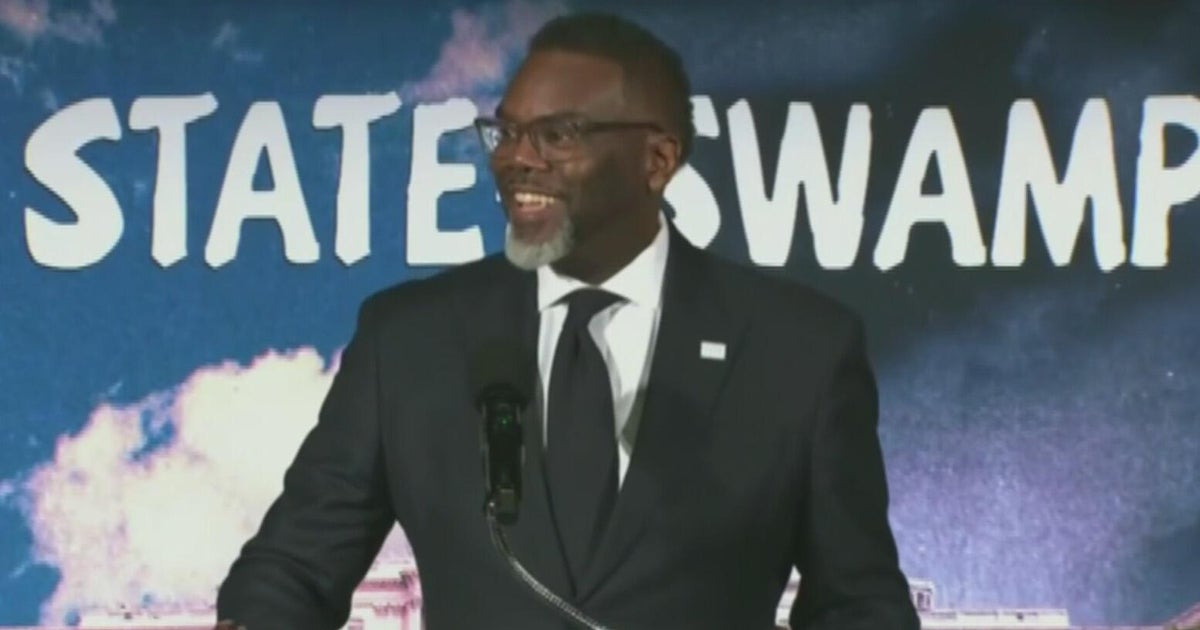Transcript: Former Defense Secretary Robert Gates on "Face the Nation," Oct. 8, 2023
The following is a transcript of an interview with former Secretary of Defense Robert Gates that aired on "Face the Nation" on Oct. 8, 2023.
MARGARET BRENNAN: And we're now joined by former Secretary of Defense Robert Gates. Good to have you here.
FORMER SECRETARY OF DEFENSE ROBERT GATES: Thank you, Margaret.
MARGARET BRENNAN: You know, you have argued again that the United States confronts graver threats to security than it has in decades and perhaps ever. Political leaders don't seem to be charting a course in your estimation. Do you see anyone on the horizon who is promising a vision?
SEC. GATES: In all honesty, I don't think so at least among those who are- who are running for president at this point. I mean, what- I haven't heard anyone articulating their vision of what America's role in the world ought to be, and where we ought to engage, how to engage, how to bring along the American people, not to mention the Congress.
MARGARET BRENNAN: Last time we spoke, though, you did say while you'd had policy differences with President Biden in the past, you liked how he was handling Ukraine. Now we're in this position where the White House, the Pentagon, the Secretary of State have warned they are running out of funding for that fight. And yet it is unclear how and when Congress can provide it. How do you see this getting resolved?
SEC. GATES: Well, my hope is that once the House has a new Speaker, and they turn in the Congress turns to the longer term appropriations process that some kind of compromise will be worked out that includes significant funds for-for Ukraine, but we've sent a terrible signal to to other countries, and not to mention Ukraine itself, but to our allies about whether- whether our commitment can be sustained. And believe me, Vladimir Putin, and I would say Xi Jinping of China, are paying very close attention, can the United States sustain and fulfill its commitments? And the one thing that may happen is that I've heard from a few senators, is that they may go for one more really big packet, rather than having to come back every few weeks for another package. And that may be another way through this impasse that we have right now.
MARGARET BRENNAN: Mr. Secretary, you know, besides Ukraine funding, the United States, Congress hasn't even passed into law, a defense bill. And in fact, the Pentagon warned Congress last week, the US had to slow down the replenishment of our own forces to hedge against an uncertain funding future. There are also hundreds of military promotions being held up. Why can't former officials like yourself prod Republican leaders to move on things like this?
SEC. GATES: I- I don't know what it would take to- to prod them to act. The fact is that the Congress has not passed an appropriations bill for the Defense Department before the beginning of the fiscal year since 2010. This is not a new problem. And, and, of course, the hold on senior promotions is really without precedent. And I think it was actually going to take a long time from which to recover, you've got a lot of displacement of families and kids wanting to go to school and sign up and their new schools and so on, it's very disruptive. And I don't understand why there hasn't been greater pressure brought to bear to put this problem behind us. This is a policy and a political issue that's at stake. These military officers really don't have any say in it, and no role. And so I just think that this is a terribly mistaken approach.
MARGARET BRENNAN: And yet there doesn't seem to be that sense of urgency that you have. Why- Why isn't that being translated?
SEC. GATES: I honestly don't know the answer to that question, Margaret. The- as I wrote in an article last week, the peril is real. Xi Jinping and- and Vladimir Putin are watching all of this paralysis in Washington. It feeds their narrative, that we are past our prime, that we can't get organized, that our system of government is broken, and- and that we are in decline, because we can't deal with these problems here at home. And- and, you know, it's it's it's both parties, frankly, in terms of how we reach these impasses and-and I just, I don't know what would light a fire under-under these politicians, to make them come to their senses about the urgency of the problems we face and the need to do something about it now, not a year from now or two years from now they're they're proceeding as though this were 1956 or something that- that nothing urgent was going on around the world.
MARGARET BRENNAN: Well, it occurs to me that that November 17 funding deadline, where the government will possibly have to shut down again, happens to coincide with a potential visit by Xi Jinping of China to U.S. soil. America's chief adversary would be meeting with President Biden in the midst of our Congress being in shutdown. Can- can you give us a sense of what signal that sends to America's adversaries?
SEC. GATES: I think Xi Jinping's first question, probably unspoken, is so how- how's it going President Biden? Because it sends the signal, again, as I was just saying that under- that underpins their view that we are in decline. We can't get anything done. We're paralyzed.
MARGARET BRENNAN: But I mean, you've said again, and again, in the years that we've spoken to you that you think polarization is the biggest threat to our country and our democracy. So, you know, within the Republican Party right now, there's this civil war, as you say, the parties also aren't working in a bipartisan way. How do we break through this at a moment that you're describing as incredibly dangerous?
SEC. GATES: It starts with leadership, both leadership in the Congress and leadership in the White House. President Biden says the right things about wanting to do bipartisan deals about reaching out to the other side and so on. But then there are actions taken that exacerbate the problem. And- and I would say the leaders of both parties in both houses of Congress bear a lot of responsibility for this. And I mean, the whole point of leadership is to be able to move things along. And I realize the destructive nature of the obstructionism and- on the Republican side in- in the House. But this is a matter for the leadership to resolve and- and how- how can you elect the Speaker who- who can't- who can't lead? This is- this is a huge problem, not just for the Republicans and for the House of Representatives, but for the country.
MARGARET BRENNAN: Well, there are two declared candidates, Jim Jordan, who has said he doesn't necessarily support aid to Ukraine, and Steve Scalise, who as a congressman has voted for it. So, I mean, is this choice really going to come down to that kind of framing here? Is there a way around it?
SEC. GATES: I have- how they- how they resolve this, this race to- to become Speaker, I think, is a mystery at this point, probably to them as well, in terms of how they get to a majority. I think a lot of things will be said in the course of that debate that people may have to walk back after the decision is made. And that's part of the problem. People say things in these campaigns, and then they're held to account to them. That's one of the things that undermined, I think, Speaker McCarthy. But I think you know how they resolve this, and in what position can the House make a decision on anything given- given the divisions in the Republican- on the Republican side in particular.
MARGARET BRENNAN: And Ukraine needs the aid as soon as possible. What we are hearing is they have critical shortages of artillery, ammunition and air defense missiles. We know around the world, other countries are running through their available stockpiles as well. So when you hear the argument that allies can make up the difference for a short period of time, is that a legitimate argument here? I mean, how do you understand the actual need?
SEC. GATES: I think that there is an immediate need. And I think that allies and other countries can probably make up some of those shortages for a brief period of time, though what's most important to Ukraine, right along with the artillery shells and ammunition and missiles and so on, is- is the confidence that the support of the democracies in the West, led by the United States, will be there for them, as the President has said, for as long as it takes. Now, we don't- there is a real risk of a long term stalemate in this conflict, at which point pressures will grow on every side in Europe, as well as here for some kind of a negotiated deal. But for the next number of months, what the Ukrainians need as much as the ammunition is the confidence that- that our support will remain steadfast.
MARGARET BRENNAN: Well, while there's one story in the House, there are a number of Republicans in the Senate who are very supportive of- of Ukraine. And yet there is this criticism that President Biden hasn't made the argument easy to them necessarily to sell at home. If President Biden is to make this major policy speech that he says he's going to make, what's the selling argument here? What does he need to persuade people?
SEC. GATES: The fundamental lesson is the importance of America continuing to accept its global leadership responsibilities. The cost of those response- of exercising those responsibilities is dramatically less than if we were to enter into a war. That leadership has led to 75 years of great power peace. That's the first time in centuries that has happened. That's our military, the institution- the international institutions we helped design, our own system for that matter. And so what is really critical is the message that- that it's in America's long term interest, that is our vital interest, to exercise that leadership, because all these things internationally are connected. I mean, as I've written is it's naive to believe that Putin's success in Ukraine would not embolden Xi Jinping to act against Taiwan. Those who say we ought not be paying attention to Ukraine, but ought to be paying attention to Taiwan don't understand that they are connected, and- and that these leaders, Xi Jinping and Vladimir Putin, are- are working together. And if we don't understand that interconnectedness, and how these events abroad affect our interests, then we're in real trouble. And that's the message that our leaders have not made. And frankly, it's not just one speech in the Oval Office- from the Oval Office. That's important, obviously. But as Franklin Roosevelt said, the most important responsibility of a leader is to educate and it's the role of the of not just the President, but leaders in Congress to help American people understand why this engagement is- is inexpensive in the long term in terms of protecting our interests, and a lot less expensive than a war with either Russia or China.
MARGARET BRENNAN: And lastly, Mr. Secretary, we overuse the word "unprecedented." But we haven't seen this play out in the U.S. Congress before. How do you understand the moment that we are in right now?
SEC. GATES: I think it's a very dangerous moment because the whole world is watching this. It's not just like this is an in house struggle that- that doesn't matter. The question is, from the- for the rest of the world, what role is the United States going to play in the rest- in the rest of the world? And both our friends and our adversaries are looking for the answer to that question. And the longer this paralysis goes on, this- the longer this stalemate, and inability to resolve big issues in the Congress goes on, the more our adversaries are encouraged, and the more our allies and friends are discouraged, and will begin to hedge against the possible loss of American leadership.
MARGARET BRENNAN: Mr. Secretary, always good to have your perspective. Thank you for joining us.
SEC. GATES: Thank you, Margaret.



